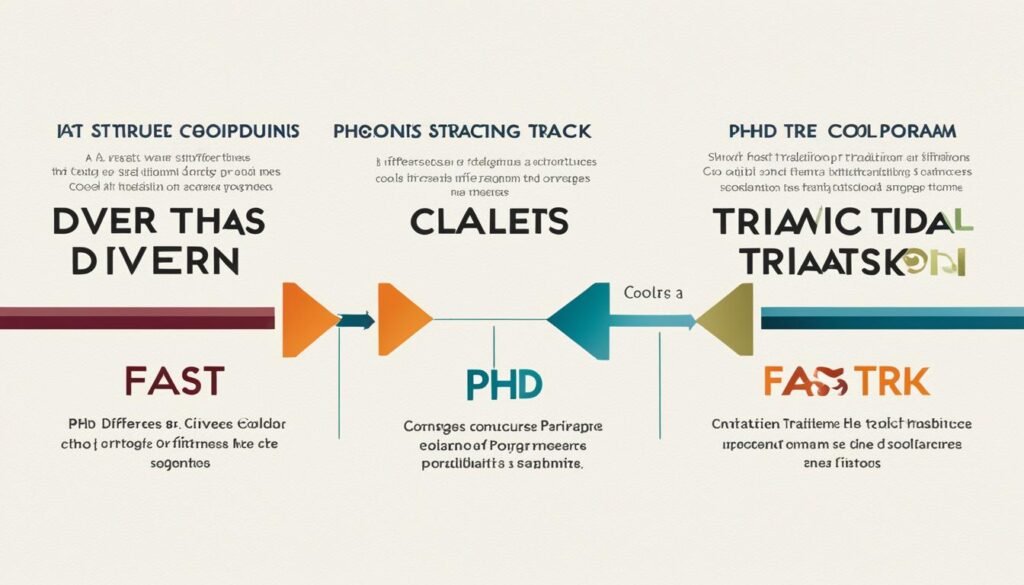Imagine you’re a driven student at Walsh College, juggling the demands of a full-time job while dreaming of one day earning your PhD. The traditional path, which typically stretches out over six to seven years, feels overly daunting and time-consuming. Enter the FastTrack program—an innovative solution that allows you to take up to four master’s-level courses that count towards both your bachelor’s and master’s degrees, as well as up to four doctoral-level courses that count towards both your master’s and doctoral degrees. With this program, what once seemed like an endless journey now becomes a manageable and efficient pathway to academic and career success.
In recent years, educational institutions like California Intercontinental University (CIU) and The Continents States University (CSU) have recognized the need for streamlined educational pathways. Their seamless transition programs make it possible to leap from a master’s directly to a PhD, further expediting the journey. This approach not only saves you time but also significantly reduces tuition costs. Imagine completing your dissertation early, thickening your resume with advanced degrees faster than you ever thought possible, all while benefiting from the subscription-based format that many institutions now offer.
With such advanced degree acceleration options, it’s now easier than ever to fast-track your education and attain those coveted letters after your name. Whether you aim to dive deep into a PhD in Criminal Justice or Psychology, these expedited PhD pathways are designed to fit within your lifestyle and career goals. The flexibility of online classes, coupled with guidance from industry professionals, makes these programs not just a dream but a viable reality. In sum, the future of higher education looks brighter and more accessible than ever before.
Key Takeaways
- Accelerated doctoral programs can significantly reduce the completion time and overall tuition costs.
- Walsh College’s FastTrack program allows students to double-count courses for multiple degrees.
- CIU and CSU offer seamless transitions from a master’s to a PhD, emphasizing online, flexible education.
- Advanced degree acceleration helps maintain a competitive edge in the job market.
- High GPA and successful writing assessments are typically required to qualify for these programs.
Understanding the Fast-Track Option
Fast-track educational pathways offer an efficient solution for students keen on expediting their academic journeys. These programs allow learners to accelerate their studies by increasing the course load each term and integrating dissertation courses earlier in the curriculum.
What is a Fast-Track Program?
A fast-track program, like those available at Walden University, is designed to accelerate the completion of advanced degrees, including accelerated PhD programs. By enrolling in fast-track educational pathways, students can handle more coursework per term and start their dissertation components earlier in their studies. This approach is ideal for those seeking expedited doctoral studies without compromising the depth and quality of their education.
Benefits of Accelerating Your Education
Opting for accelerated PhD programs brings a wealth of advantages. Firstly, it significantly reduces the time required to earn a degree, which is a crucial factor in remaining competitive in the job market. By cutting down on time invested, students also stand to save on tuition costs, potentially reducing expenses by up to 20%. Moreover, fast-track educational pathways often align with professional goals, allowing students to advance their careers promptly while acquiring essential competencies along the way.
Examples of Fast-Track Programs
Walden University offers exemplary models of expedited doctoral studies, including the PhD in Criminal Justice and the PhD in Psychology. These programs require students to manage heavier course loads and incorporate dissertation courses earlier, ensuring a swift yet comprehensive pathway to earning a doctorate. Similarly, California Intercontinental University (CIU) and The Continents States University (CSU) have collaborated to create seamless transitions from master’s to PhD programs. CIU’s innovative online education and CSU’s focus on affordable, competency-based learning provide students with flexible, personalized support for their expedited doctoral studies.
Eligibility Criteria for Fast-Track Programs
Fast-track programs offer an excellent opportunity for students to accelerate their educational journey. However, these programs have specific eligibility criteria that must be met.

Required GPA and Academic Performance
To qualify for fast-track program admissions, students generally need to maintain a high cumulative GPA. For example, students eligible for fast-tracking from a Master’s program to a Doctoral program must have a CGPA of 3.5 or higher. Additionally, they must have completed a minimum of 2 full-time terms and no more than 4 full-time terms in their Master’s program. These fast-tracked students enter the doctoral program at the PhD2 level. Institutions emphasize strong academic performance to ensure students are prepared for the rigorous demands of doctoral studies.
Application and Admission Requirements
Meeting the academic prerequisites for PhD programs involves more than just achieving a specific GPA. Students must also pass pertinent assessments, such as writing assessments, and submit detailed application essays. Walden University, for instance, has structured policies for fast-track program admissions, requiring a robust application demonstrating research capabilities and a strong academic record. In the context of various Master’s programs, students might need to have backgrounds in particular fields, such as Engineering or Business Administration, and meet specific GPA thresholds to have documentation requirements waived. This streamlines the application process, making it more efficient for eligible candidates.
Moreover, institutions like California Intercontinental University (CIU) and The Continents States University (CSU) facilitate smooth transitions from Master’s to PhD programs with personalized support and flexible online schedules, ensuring that students navigate the path to their doctoral degrees seamlessly.
Popular Fast-Track Doctoral Programs
For students aiming to complete their doctoral education expeditiously, several institutions offer popular fast-track programs. These programs are designed to provide an accelerated pathway to earning a PhD or Doctor of Nursing Practice with a more intense and concentrated workload.
PhD in Criminal Justice
Walden University provides a fast-track PhD Criminal Justice program tailored for individuals aiming to advance rapidly in their careers. The accelerated format includes an intensive course load and early commencement of dissertation work. This structure intends to reduce the completion time significantly compared to traditional programs, offering a more efficient route to achieving higher academic credentials.
PhD in Psychology
The accelerated Psychology PhD at Walden University is another prime example of expedited doctoral studies. This program builds on rigorous coursework and early dissertation integration, allowing students to focus deeply on their research interests and professional goals. The condensed timeline helps students achieve their doctoral ambitions quicker, optimizing their investment of time and financial resources.
Doctor of Nursing Practice
For nursing professionals, the online Doctor of Nursing Practice fast-track programs, such as those offered by Maryville University, provide an excellent opportunity for rapid advancement. Maryville’s DNP program typically requires 33 credit hours and can be completed within 18 to 20 months. This program emphasizes applied research and clinical practice, eliminating the need for a traditional dissertation and thereby speeding up the path to degree completion.
Moreover, similar to Maryville’s offerings, institutions like Franklin University and South College structure their doctoral programs with flexibility and affordability in mind. Franklin allows up to 40% transfer of required credits, and South College provides a flat tuition rate, making these accelerated paths more accessible.
Online Fast-Track Programs: Flexibility and Convenience
Online fast-track programs provide the ultimate flexibility, making it possible for students to seamlessly manage their studies alongside personal and professional commitments. Through these accelerated programs, students achieve a work-study balance in academia without compromising on any aspect of their life. The convenience offered by online PhD programs is unparalleled, especially with the support from institutions like California Intercontinental University (CIU) and The Continents States University (CSU).
Advantages of Online Learning
One of the significant advantages of online fast-track PhD programs is the ability to study from any location while adhering to a flexible schedule. This allows students to engage in flexible doctoral studies, fitting their academic pursuits around their existing commitments. CIU and CSU’s partnership ensures personalized support and access to innovative online education, providing a seamless transition from a master’s to a PhD. This collaboration emphasizes academic excellence and affordability, facilitating a smooth and efficient path to a doctoral degree.

Balancing Work, Life, and Study
Achieving a work-study balance in academia is crucial for many doctoral candidates. The flexibility inherent in online PhD programs allows students to balance their workload without the need to sacrifice personal or professional commitments. With CIU and CSU offering competency-based learning, students can progress at their own pace, ensuring they meet their educational goals efficiently. The accelerated nature of these programs enables students to complete their studies in a shorter timeframe compared to traditional semester-length courses, ultimately providing them with the convenience and adaptability needed to succeed in their academic and professional endeavors.
Partner Institutions Offering Seamless Transitions
Embarking on a PhD journey can be streamlined through strategic partnerships between institutions. California Intercontinental University (CIU) and The Continents States University (CSU) exemplify effective collaborations in offering a seamless transition from master’s to doctoral programs. These universities place a strong emphasis on online education and competency-based learning, ensuring that your educational journey is both flexible and supportive.
California Intercontinental University (CIU)
At CIU, students benefit from innovative online programs and a commitment to academic excellence. The university’s focus on CIU PhD programs is designed to meet the diverse needs of its students, providing personalized support to ensure a seamless transition to a PhD. Through flexible and affordable pathways, CIU facilitates a smooth progression for students aiming to achieve their doctoral degrees.
The Continents States University (CSU)
CSU is renowned for its affordable, competency-based learning approach. The CSU accelerated degrees are structured to offer an efficient pathway for educational advancement. By collaborating with CIU, CSU ensures that students experience a seamless transition to PhD programs. This partnership supports a coherent educational trajectory from master’s to doctoral studies, emphasizing flexibility and quality education.
Comparing Traditional vs. Fast-Track Program Structures
When deciding between the traditional PhD structure and a fast-track route, understanding the differences is key. Traditional PhD programs usually span 3-5 years and follow a paced academic journey. These programs are designed to build a deep foundation of knowledge and extensive research skills. In contrast, fast-track programs, such as the ones offered by institutions like California Intercontinental University (CIU) and The Continents States University (CSU), are structured to compress this lengthy timeline.
Fast-track PhD programs incorporate dissertation courses earlier in the academic journey, often integrating them with initial coursework. This approach not only expedites the completion of the degree but also allows students to apply concepts in real-time. Traditional programs might have several residencies, while fast-track programs might require fewer to reduce travel and accommodation costs.

An important aspect of the comparison of doctoral programs is the course load. Fast-track programs demand higher course loads each term, which can be both a challenge and an advantage. By completing more credits each term, students can accelerate their academic progress. Another critical difference is the residency requirements, which are often fewer in number for fast-track programs. This reduction translates into lower living expenses and quicker transitions into professional roles.
The advantages of fast-track PhD programs are evident in both immediate cost savings and career acceleration. By shortening the duration of study, students incur fewer tuition fees and additional costs related to living expenses. Moreover, entering the workforce sooner can potentially result in earlier career advancements and opportunities. CIU and CSU’s seamless transition from a master’s to a PhD highlights how keeping educational goals streamlined can offer a clear and efficient academic path.
Breaking Down the Timeline: From Master’s to PhD
The journey from a Master’s to a PhD is notably accelerated in fast-track programs. This type of accelerated PhD timeline is designed to expedite your academic progression, thereby reducing the usual time investment. Typically, achieving a PhD in fields like physics in the USA takes five to seven years. However, fast-track programs compress this duration by leveraging an increased course load each term and integrating dissertation work earlier in the process.
Course Load and Pace
In a fast-track program, the course load is significantly heavier compared to traditional paths. While a standard PhD might span several years of coursework followed by the dissertation, fast-track PhDs seamlessly blend these elements. This approach means you’ll be working on your dissertation phase in fast-track mode alongside your coursework, substantially trimming down the overall duration of your program.
Dissertation Process
The dissertation phase in fast-track programs is unique. Instead of tackling the dissertation as a standalone final stage, you’ll commence this critical phase earlier. This integrated method allows you to progressively build your research while still enrolled in other courses, thereby streamlining the entire doctoral journey.
Residency Requirements
Residency requirements in a fast-track PhD program differ from traditional settings. These programs are often more flexible, with virtual or intermittent in-person residencies catered to fit within your accelerated timeline. For instance, at institutions like Walden University, these residencies are included in tuition and designed to be compatible with your fast-paced schedule. This structure ensures that the residency in doctoral programs doesn’t become a bottleneck in your accelerated educational journey.
Moreover, California Intercontinental University (CIU) and The Continents States University (CSU) provide an excellent model of seamless transition from a Master’s to PhD. CIU’s commitment to innovative online education and CSU’s emphasis on affordable, competency-based learning assure personalized support throughout their flexible programs. This cooperation exemplifies how residency requirements can be met efficiently in an electronic or hands-on setting depending on the program specifics.
Financial Implications of Fast-Track Programs
Fast-track programs offer the advantage of potentially lower educational costs through streamlined courses and reduced time to degree completion. Understanding the cost of fast-track PhD programs and their financial structure is essential when considering this educational pathway.

Tuition and Fees
Institutions like Walden University offer accelerated doctoral programs with subscription-based formats, allowing students to manage their expenses better and potentially save up to 20% on tuition. The annual pay for graduate student teaching or staff stipends at universities like UCLA ranges from $15,000 to $22,000, while living costs, such as $1,200 monthly rent in Los Angeles, can significantly impact the overall cost of education. As the number of tenure-track positions in public universities decreases, understanding the full financial landscape becomes crucial.
Potential Savings
Enrolling in accelerated programs means you spend less time in the program, consequently paying less tuition and related fees overall. For example, California Intercontinental University (CIU) and The Continents States University (CSU) provide flexible online programs designed for a seamless transition from a master’s to a PhD, emphasizing tuition savings in accelerated programs. With organizations like the Ford Foundation and the National Science Foundation offering funding opportunities, leveraging these financial benefits of expedited education can further enhance affordability.
Preparing for Success in Fast-Track Programs
Achieving success in fast-track doctoral programs necessitates strategic planning and effective resource utilization. The accelerated nature of these programs can significantly reduce the time and cost associated with earning a doctorate, yet they also demand a high level of commitment and preparedness.
Building a Strong Application
Start by creating a competitive application for fast-track PhD programs. Ensure you maintain a robust GPA, typically 3.0 or higher, and complete all prerequisite courses. Schools like CIU and CSU, which emphasize academic excellence and affordable learning, set clear criteria for fast-track admissions. Highlighting your research capabilities and academic achievements in your application essay can strengthen your candidacy.
Managing Your Time Effectively
Time management for doctoral students is crucial, especially in fast-track programs. Balancing an intensive course load while pursuing a fast-track PhD requires a well-organized schedule. Break down your tasks into manageable portions, prioritize your assignments, and allocate specific time blocks for study and research. Using digital tools, like calendar apps and project management software, can streamline your workflow and enhance your productivity.
Utilizing Campus Resources
Maximizing the use of campus resources is essential for thriving in an accelerated program. Access academic advising, libraries, and online databases to support your studies. Engage with faculty and peers in collaborative endeavors to enrich your learning experience. California Intercontinental University (CIU) and The Continents States University (CSU) offer personalized support mechanisms and innovative online platforms that facilitate a seamless transition from a master’s to a PhD program, ensuring you have the necessary tools to succeed.
Case Study: Transitioning from Master’s to PhD at CIU and CSU
The journey from a Master’s to a PhD at California Intercontinental University (CIU) and The Continents States University (CSU) has become increasingly seamless, thanks to their innovative partnership. CIU, known for its commitment to academic excellence through online education, and CSU’s emphasis on affordable, competency-based learning, offer a streamlined and efficient path for students. Both institutions have designed their programs to cater to the needs of students seeking flexible, online PhD options.
A significant advantage of this partnership lies in the support system provided. Personalized guidance throughout the program ensures that students stay on track and meet their academic goals efficiently. CIU PhD success stories highlight how students have benefited from this tailored approach, making transitions smoother and less daunting. Additionally, the non-dissertation doctoral programs, such as the EdD in Organizational Leadership, offer an alternative pathway for those looking for specialized competencies without the traditional dissertation process.
The success rates of these programs are commendable. Many students have reported positive transitions from master’s to doctoral studies, attributing their achievements to the robust academic frameworks and supportive environments at CIU and CSU. Feedback often underscores the flexibility of the programs, allowing for a balance between professional commitments and academic progression. This transition has provided tangible real-world implications, leading to enhanced career opportunities and significant academic contributions in their respective fields.
Source Links
- https://walshcollege.edu/fasttrack/
- https://forum.lowyat.net/topic/4769241
- https://www.physicsforums.com/threads/fast-track-masters-advantages-disadvantages-fields.172797/
- https://www.findaphd.com/advice/phd-discussion-thread.aspx?thread=37432&order=2
- https://www.mcgill.ca/gps/students/registration/progress/fast-track
- https://daytonabeach.erau.edu/admissions/graduate/fast-track
- https://spalding.edu/academics/fast-track-programs/
- https://www.phds.me/online-programs/education-doctorate-edd/fastest/
- https://www.bestcolleges.com/accelerated-degrees/accelerated-doctorate-online/
- https://www.edsmart.org/shortest-doctoral-programs-online/
- https://yesbud.online/fast-track/
- https://walshcollege.edu/admissions-advising/walsh-and-macomb-announce-comprehensive-partnership/
- https://gordon.tufts.edu/news-events/news/fast-track-success-five-advantages-fifth-year-masters-program-tufts-gordon-institute
- https://bemoacademicconsulting.com/blog/1-year-masters-programs
- https://www.bestcolleges.com/blog/accelerated-degree-program-right-for-me/
- https://www.findaphd.com/guides/differences-between-masters-and-phd-study
- https://www.physicsforums.com/threads/reasonable-degree-timeline-for-undergraduate-masters-phd.515020/
- https://www.findaphd.com/guides/the-phd-journey
- https://www.coursera.org/articles/how-long-does-it-take-to-get-a-phd
- https://www.aaup.org/article/why-graduate-students-reject-fast-track
- https://blog.accepted.com/the-myth-of-the-fully-funded-phd-using-scholarships-to-mitigate-the-financial-realities-of-research-degrees/
- https://www.investopedia.com/articles/professionaleducation/11/accelerated-bachelors-masters-degree.asp
- https://www.phds.me/online-programs/one-year-doctoral-programs/
- https://www.metagenicsinstitute.com/blogs/thyroid-disease/
- https://www.organizationalpsychologydegrees.com/best/online-masters-in-organizational-leadership/
- https://tspace.library.utoronto.ca/bitstream/1807/34067/1/Jeram_Sanjay_201211_PhD_thesis.pdf


